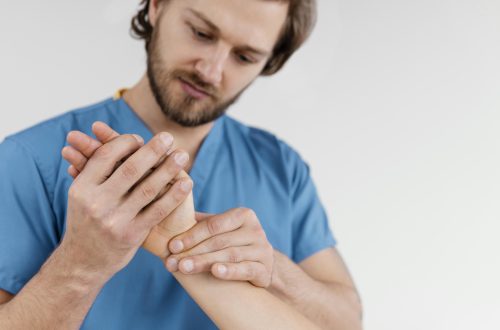Knee arthritis is a common condition that affects millions of people around the world, especially as they age. Characterized by joint pain, stiffness, and reduced mobility, it can significantly impact your quality of life. One of the most frequently asked questions is: Can knee arthritis be cured? The answer is complex while there’s no permanent cure, there are many effective ways to manage and reduce its symptoms, and in some cases, slow its progression.
Understanding Knee Arthritis
Knee arthritis refers to inflammation and degeneration of the knee joint. The two most common types are:
- Osteoarthritis (OA): A degenerative condition that results from wear and tear over time.
- Rheumatoid Arthritis (RA): An autoimmune disorder where the immune system attacks joint tissues.
Both types can cause pain, swelling, and reduced range of motion. The condition can worsen over time if not properly managed.
Is Knee Arthritis Curable?
Currently, knee arthritis cannot be completely cured, especially in cases of osteoarthritis where cartilage damage is permanent. However, many treatment options are available to control symptoms and improve joint function. Early intervention plays a vital role in slowing down the progression of arthritis and preserving joint health.
Let’s explore the various treatment and management approaches.
Non-Surgical Treatment Options
1. Physical Therapy
Physical therapy can strengthen the muscles around the knee, improve flexibility, and reduce pain. Therapists tailor exercises based on the severity of arthritis, ensuring minimal stress on the joints.
2. Medications
Doctors may prescribe:
- NSAIDs (like ibuprofen) for inflammation and pain.
- Corticosteroid injections for severe flare-ups.
- Hyaluronic acid injections to lubricate the joint.
While these don’t cure arthritis, they provide symptom relief.
3. Weight Management
Carrying excess weight puts additional stress on knee joints. Losing just a few pounds can significantly reduce pain and slow arthritis progression.
4. Lifestyle Changes
Low-impact exercises like swimming, cycling, and walking can keep the joints active without straining them. Avoiding high-impact sports and practicing proper posture also help protect the knees.
5. Supplements and Natural Remedies
Some patients find relief with supplements like glucosamine and chondroitin, though research on their effectiveness is mixed. Anti-inflammatory diets rich in omega-3s, fruits, and vegetables can also support joint health.
Surgical Treatment Options
If non-surgical treatments fail, surgery might be recommended, especially in advanced arthritis cases.
1. Arthroscopy
A minimally invasive procedure to clean out damaged cartilage. It offers temporary relief but is not a long-term solution.
2. Osteotomy
Involves cutting and realigning bones to relieve pressure on the knee joint. Suitable for younger patients with early-stage arthritis.
3. Knee Replacement Surgery
In severe cases, total or partial knee replacement can restore joint function. While not a cure, it can eliminate pain and restore mobility for many years.
Can Arthritis Be Reversed?
Unfortunately, once cartilage is damaged, it does not regenerate naturally. However, ongoing research in regenerative medicine (like stem cell therapy) shows promise. These treatments are still under study and not widely available, but they could offer hope for future arthritis cures.
Preventing Knee Arthritis Progression
While a cure might not be available, the goal is to manage symptoms and prevent further damage. Here are some tips:
- Stay physically active with low-impact activities.
- Follow a balanced diet to reduce inflammation.
- Use knee supports or braces if necessary.
- Avoid overuse or repetitive strain on the joints.
- Consult a specialist regularly to monitor joint health.
Conclusion
So, can knee arthritis be cured? Not at present but it can be managed effectively. With early diagnosis, proper treatment, and lifestyle changes, many people with knee arthritis continue to live active, fulfilling lives. It’s all about taking control of your joint health and working closely with healthcare professionals to find the right treatment plan for you.
Read More – Does Sciatica Cause Knee Pain





